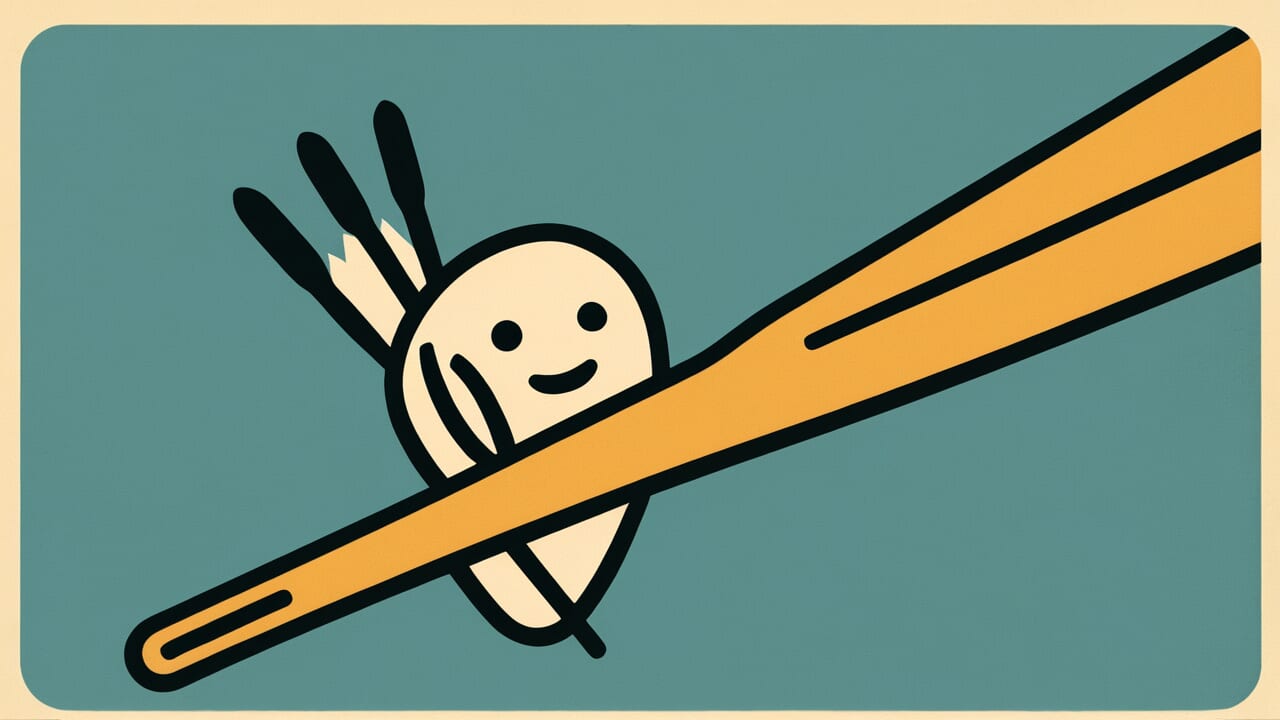How to Read “Hitting against chopsticks and hitting against sticks”
Hashi ni atari bō ni ataru
Meaning of “Hitting against chopsticks and hitting against sticks”
This proverb describes taking out your anger on people who have nothing to do with what upset you. It refers to a state where you vent your frustration and anger at innocent people or objects.
For example, someone scolded by their boss at work comes home and treats their family coldly or yells over small things. Or a student who got bad test results overreacts to a friend’s casual comment.
This expression points out the unfairness of anger being redirected away from its true target toward innocent parties. The image of hitting even everyday tools like chopsticks and sticks vividly shows how anger spreads without discrimination.
Even today in our stressful society, controlling emotions can be difficult. This proverb serves as a warning to help maintain smooth relationships.
Origin and Etymology
The exact first appearance of this proverb in literature is unclear. However, the structure of the phrase offers interesting insights.
There’s a reason why chopsticks and sticks were chosen. Chopsticks are familiar tools that Japanese people use every day. You handle them at every meal – they’re essential to daily life.
Sticks are also commonly seen in everyday life, used for cleaning or moving things. In other words, this proverb chose chopsticks and sticks to symbolize “ordinary, innocent things found everywhere.”
The word “hitting” (ataru) is also noteworthy. While it means “to bump into” or “to collide,” here it means to direct anger at something. Hitting even chopsticks and sticks that should have nothing to do with your anger.
This expression vividly conveys how uncontrolled anger spreads to everything around you.
The leading theory suggests this expression emerged from the everyday sensibilities of common people during the Edo period. In the narrow tenement houses where people lived, emotional outbursts easily affected those nearby.
As practical wisdom for such living conditions, words were needed to caution against unreasonable anger.
Usage Examples
- Taking revenge for being scolded by the department head by excessively blaming a junior colleague for a minor mistake is truly hitting against chopsticks and hitting against sticks
- She’s in a state of hitting against chopsticks and hitting against sticks from the shock of her breakup, taking out her frustration on anyone who talks to her
Universal Wisdom
The proverb “Hitting against chopsticks and hitting against sticks” touches on a universal truth about the difficulty of controlling human emotions. Why do people take things out on those unrelated to the real cause of their anger?
It’s because human emotions aren’t always rational. Anger originally arises as a defensive reaction to protect ourselves. However, in modern society, there are many situations where you can’t directly confront the true target of your anger.
You can’t talk back to your boss. You can’t change test results. A lost lover won’t come back. This sense of powerlessness redirects the energy of anger elsewhere.
This proverb has been passed down through generations because everyone experiences this human weakness. Anger is contagious. The person who receives misdirected anger then takes it out on someone else.
From chopsticks to sticks, from sticks to something else – a negative chain reaction spreads.
Our ancestors understood this emotional chain reaction. They teach us that to break it, we must first become aware of where our anger is directed.
Noticing when you’re taking things out on innocent people – that’s the first step in protecting relationships.
When AI Hears This
The human brain doesn’t record the thousands of “nothing happened” events that occur daily. For example, you pick up chopsticks dozens of times a day, but nobody counts how many times they moved smoothly without hitting anything.
However, the moment chopsticks hit a bowl with a clink, that instant is vividly remembered. This is the brain’s “negativity bias” – a survival strategy that prioritizes storing information about dangers and failures.
What’s more interesting is that once you think “I keep hitting things today,” your brain starts looking only for “hitting events.” Confirmation bias kicks in, and even small contacts you’d normally ignore – touching a stick, bumping your shoulder on a door – get collected as evidence that “see, I hit something again.”
In reality, the 99 times you moved chopsticks without hitting anything versus the 1 time you did is statistically a 1% occurrence. Yet it feels like “I’m constantly hitting things.”
In other words, most “hitting against chopsticks and hitting against sticks” situations aren’t about increased actual contact in the real world. It’s just that your brain’s attention filter has changed.
You’re not unlucky – your cognition has simply switched to “searching for bad luck” mode. Recognizing this cognitive trap can free you from the feeling of a chain of misfortune.
Lessons for Today
This proverb teaches modern people the importance of being aware of where you direct your emotions. When you’re irritated, who or what are you taking it out on? Is that target really the cause of your anger?
In modern society, the sources of stress are complex and hard to see. Work pressure, relationship troubles, anxiety about the future. These intertwine until sometimes you don’t even know what you’re angry about.
That’s exactly why you need time to stop and think.
This proverb functions as a “pause button” when you become emotional. Asking yourself “Am I in a state of hitting against chopsticks and hitting against sticks right now?” can trigger a return to calmness.
And if you become the target of someone else’s misdirected anger, remember this proverb. Their anger might not really be directed at you. With that understanding, you can avoid unnecessary hurt and avoid joining the chain of anger.
Having the courage to break the flow of emotion – that’s the wisdom this proverb offers to those of us living in modern times.



Comments